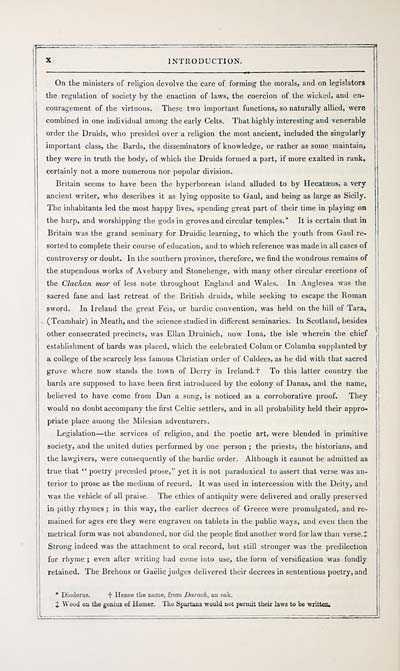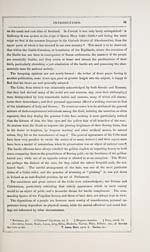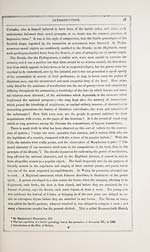Blair Collection > Sar-obair nam bard gaelach, or, The beauties of Gaelic poetry, and lives of the Highland bards
(20)
Download files
Complete book:
Individual page:
Thumbnail gallery: Grid view | List view

i INTRODUCTION.
On the ministers of religion devolve the care of forming the morals, and on legislators
the regulation of society by the enaction of laws, the coercion of the wicked, and en-
couragement of the virtuous. These two important functions, so naturally allied, were
combined in one individual among the early Celts. That highly interesting and venerable
order the Druids, who presided over a religion the most ancient, included the singularly
important class, the Bards, the disseminators of knowledge, or rather as some maintain,
they were in truth the body, of which the Druids formed a part, if more exalted in rank,
certainly not a more numerous nor popular division.
Britain seems to have been the hyperborean island alluded to by Hecataeus, a very
ancient writer, who describes it as lying opposite to Gaul, and being as large as Sicily.
The inhabitants led the most happy lives, spending great part of their time in playing on
the harp, and worshipping the gods in groves and circular temples.* It is certain that in
Britain was the grand seminary for Druidic learning, to which the youth from Gaul re-
sorted to complete their course of education, and to which reference was made in all cases of
controversy or doubt. In the southern province, therefore, we find the wondrous remains of
the stupendous works of Avebury and Stonehenge, with many other circular erections of
the Clachan mor of less note throughout England and Wales. In Anglesea was the
sacred fane and last retreat of the British druids, while seeking to escape the Roman
sword. In Ireland the great Feis, or bardic convention, was held on the hill of Tara,
(Teamhair) in Meath, and the science studied in different seminaries. In Scotland, besides
other consecrated precincts, was Elian Druinich, now lona, the isle wherein the chief
establishment of bards was placed, which the celebrated Colum or Columba supplanted by
a college of the scarcely less famous Christian order of Culdees, as he did with that sacred
grove where now stands the town of Derry in Ireland, t To this latter country the
bards are supposed to have been first introduced by the colony of Danas, and the name,
believed to have come from Dan a song, is noticed as a corroborative proof. They
would no doubt accompany the first Celtic settlers, and in all probability held their appro-
priate place among the Milesian adventurers.
Legislation — the services of religion, and the poetic art, were blended in primitive
society, and the united duties performed by one person ; the priests, the historians, and
the lawgivers, were consequently of the bardic order. Although it cannot be admitted as
true that " poetry preceded prose," yet it is not paradoxical to assert that verse was an-
terior to prose as the medium of record. It was used in intercession with the Deity, and
was the vehicle of all ])raise. The ethics of antiquity were delivered and orally preserved
in pithy rhymes ; in this way, the earlier decrees of Greece were promulgated, and re-
mained for ages ere they were engraven on tablets in the public ways, and even then the
metrical form was not abandoned, nor did the people find another word for law than verse.J
Strong indeed was the attachment to oral record, but still stronger was the predilection
for rhyme ; even after writing had come into use, the form of versification was fondly
retained. The Brehons or Gaelic judges delivered their decrees in sententious poetry, and
* Diodorus. -j- Hence the u.irae, from Darach, an oak.
X Wood 00 the genius of Uomer. The Spartans would not permit theii laws to be written.
On the ministers of religion devolve the care of forming the morals, and on legislators
the regulation of society by the enaction of laws, the coercion of the wicked, and en-
couragement of the virtuous. These two important functions, so naturally allied, were
combined in one individual among the early Celts. That highly interesting and venerable
order the Druids, who presided over a religion the most ancient, included the singularly
important class, the Bards, the disseminators of knowledge, or rather as some maintain,
they were in truth the body, of which the Druids formed a part, if more exalted in rank,
certainly not a more numerous nor popular division.
Britain seems to have been the hyperborean island alluded to by Hecataeus, a very
ancient writer, who describes it as lying opposite to Gaul, and being as large as Sicily.
The inhabitants led the most happy lives, spending great part of their time in playing on
the harp, and worshipping the gods in groves and circular temples.* It is certain that in
Britain was the grand seminary for Druidic learning, to which the youth from Gaul re-
sorted to complete their course of education, and to which reference was made in all cases of
controversy or doubt. In the southern province, therefore, we find the wondrous remains of
the stupendous works of Avebury and Stonehenge, with many other circular erections of
the Clachan mor of less note throughout England and Wales. In Anglesea was the
sacred fane and last retreat of the British druids, while seeking to escape the Roman
sword. In Ireland the great Feis, or bardic convention, was held on the hill of Tara,
(Teamhair) in Meath, and the science studied in different seminaries. In Scotland, besides
other consecrated precincts, was Elian Druinich, now lona, the isle wherein the chief
establishment of bards was placed, which the celebrated Colum or Columba supplanted by
a college of the scarcely less famous Christian order of Culdees, as he did with that sacred
grove where now stands the town of Derry in Ireland, t To this latter country the
bards are supposed to have been first introduced by the colony of Danas, and the name,
believed to have come from Dan a song, is noticed as a corroborative proof. They
would no doubt accompany the first Celtic settlers, and in all probability held their appro-
priate place among the Milesian adventurers.
Legislation — the services of religion, and the poetic art, were blended in primitive
society, and the united duties performed by one person ; the priests, the historians, and
the lawgivers, were consequently of the bardic order. Although it cannot be admitted as
true that " poetry preceded prose," yet it is not paradoxical to assert that verse was an-
terior to prose as the medium of record. It was used in intercession with the Deity, and
was the vehicle of all ])raise. The ethics of antiquity were delivered and orally preserved
in pithy rhymes ; in this way, the earlier decrees of Greece were promulgated, and re-
mained for ages ere they were engraven on tablets in the public ways, and even then the
metrical form was not abandoned, nor did the people find another word for law than verse.J
Strong indeed was the attachment to oral record, but still stronger was the predilection
for rhyme ; even after writing had come into use, the form of versification was fondly
retained. The Brehons or Gaelic judges delivered their decrees in sententious poetry, and
* Diodorus. -j- Hence the u.irae, from Darach, an oak.
X Wood 00 the genius of Uomer. The Spartans would not permit theii laws to be written.
Set display mode to: Large image | Transcription
Images and transcriptions on this page, including medium image downloads, may be used under the Creative Commons Attribution 4.0 International Licence unless otherwise stated. ![]()
| Early Gaelic Book Collections > Blair Collection > Sar-obair nam bard gaelach, or, The beauties of Gaelic poetry, and lives of the Highland bards > (20) |
|---|
| Permanent URL | https://digital.nls.uk/81868108 |
|---|
| Description | A selection of books from a collection of more than 500 titles, mostly on religious and literary topics. Also includes some material dealing with other Celtic languages and societies. Collection created towards the end of the 19th century by Lady Evelyn Stewart Murray. |
|---|
| Description | Selected items from five 'Special and Named Printed Collections'. Includes books in Gaelic and other Celtic languages, works about the Gaels, their languages, literature, culture and history. |
|---|

